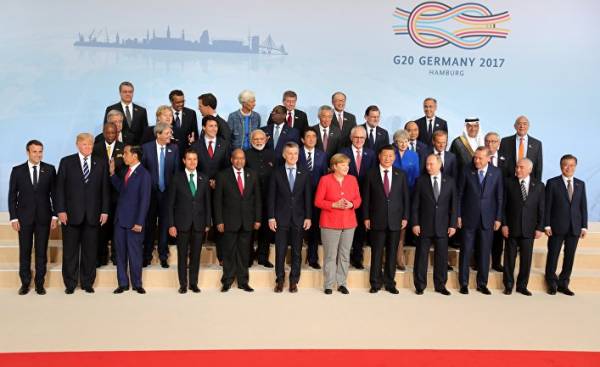
Started the summit of “big twenty” and nervousness intensified. The leaders of the major world economies meet in a completely new environment. Brakcet, the failure of the referendum in Italy, the elections in the US, UK and France became an expression of mass protest against the political establishment. The discontent of the working population is the lack of wage growth and uncertainty about the future was evident on both sides of the Atlantic ocean in the Northern hemisphere. The group of twenty previously represented a world order based on principles of market and open economy, which has been called into question by the unexpected election results.
In this situation, the traditional communiqué statements that the country undertake structural reforms and to fight protectionism, perceived as remnants of the past. The contradictions manifested in the course of the Ministerial meetings before the start of the G20 summit and at the recent session of heads of States and governments of “big seven” (G7). The message about the unilateral US withdrawal from the Paris climate agreement increases the tension.
The new US President comes to open conflict, but in fact the reasons for this tension is much more deep. In the process of globalization is always some benefit and others lose, but in recent years the number of losers has increased dramatically. This is demonstrated by the concentration of income and wealth in the hands of the wealthiest 10% of the population — especially among the 1% richest people in the world. In the G20 countries differing trends in inequality. If in the most economically developed countries, the situation in the sphere of income distribution has worsened in the emerging economies (China, India, Argentina, Turkey, Russia, South Africa) registered an increase of salaries and the numerical increase of the middle class. But the level of inequality in these countries as regards the distribution of income and wealth, is very high. In almost all G20 countries have decreased the size of the national income per capita of the working population. The citizens of Nations throughout the world, there is good reason to believe that the global economy benefits only a few, and does not contribute to the welfare of the majority.
About these trends and about alternatives to such development reported on sessions of the “big twenty” in recent years, the international labour organization (ILO) and a number of other structures. Some countries, including Argentina and Brazil when the previous President, take urgent measures to increase the income of the working population and to reduce inequalities. Their example in some cases, followed by Turkey, China, South Africa, Russia, France and the United States. But other countries-members of the G20 have ignored these proposals, and despite some progress, the state of the “group of twenty” preferred to bet on traditional measures without limitations (not paying attention to their negative consequences), structural reforms (including deregulation of the labour market) and the “tax consolidation” (including reductions in spending on health, education and housing).
Germany, the host of the G20 summit, recognized the need to give multilateral response to topical issues and invited to discuss “the threats and challenges of globalization”. But now it is not cosmetic and rhetorical language, which was used in the past. What is an adequate response to the G20? Below put forward a number of assumptions.
With regard to trade, since 2008, the “big twenty” was repeated like a mantra, the words about the need to “fight against protectionism in all its manifestations.” This continued until the meeting of Finance Ministers in March this year, where the United States voted against this thesis. Communiqué of the meeting reads: “We are working to strengthen the contribution of trade to our economy.” Although this new language is a logical appeal that trade contributed to the implementation of tasks in the economic and social sphere, many perceived it as a big step backwards in relation to traditional statement. This communiqué was mistakenly considered trade as an end in itself. Of course, trade is not an end in itself. This tool, which should ensure greater efficiency of the economy, and she, in turn, should help increase the standard of living. In Hamburg, the heads of state have to go in a new direction and to develop internal policies that will meet the requirements of more inclusive growth.
As regards structural reforms, it is necessary to abandon lack of regulation of the labour market and the weak regulatory mechanism of financial markets. Obvious trends in the countries of “big twenty” demonstrates that the working population no necessary protection. On the contrary, the regulatory mechanisms that ensure greater protection of workers ‘ rights, establishing an adequate minimum wage and strengthening the social protection system should be adopted and endorsed by the G20, and is also adapted to the situation in each country. In addition, the reform of financial markets is not yet completed and should be continued.
In tax and monetary policy, the best moment for the G20 was in 2008, when an agreement was reached on the coordinated stimulation of major economies to combat the financial crisis. But the decision taken by the G20 in 2010-2011, the change rate and the rate on the “tax consolidation” (budget austerity measures) instead of continuing the policy aimed at supporting economic recovery, was a historic mistake that led to a prolonged recession in the EU and the weak pace of recovery in global scale. It is necessary to recognize and correct.
The G20 requires a new approach in the field of international economic cooperation. The results of the recent elections in the US and Europe — in particular, the position of the administration of Donald trump — seem unexpected, but it’s all interrelated problems for which it is necessary to change course.
You can take steps to improve the living standards of the majority of the population and promoting inclusive and stable growth, or continue the satisfaction about chauvinistic interests that will put multilateralism in jeopardy. The feeling that economic policies are manipulated in the interests of elites and corporations, causes dissatisfaction. If the “big twenty” will attempt to restore the status quo, it can blame the fact that it pursues its own interests in this conflict, or worse — inaction. This year the summit will take important decisions.
Cecilia Naon — program Manager’s Model “G20” at American University and former Sherpa of Argentina in the G20.
Sandra Polaski is an expert in the field of labour and social security, former Deputy Director General for policy ILO, former ILO Sherpa to the G20.







